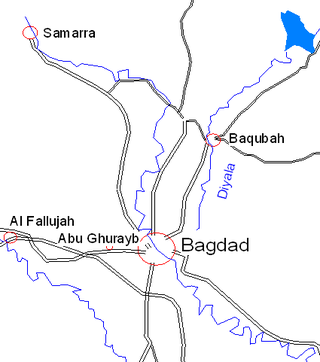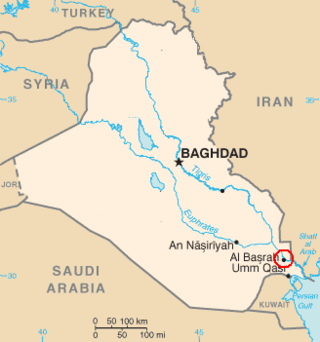| January 2011 Iraq suicide attacks | |
|---|---|
| Location | Baghdad, Baqubah, Karbala and Tikrit, Iraq |
| Date | 18–20 January 2011 24 January 2011 27 January 2011 (UTC+03:00) |
| Target | Shia pilgrims, police buildings, funeral tent |
Attack type | Car bombs, suicide bombing, shooting, roadside bombings |
| Deaths | 137+ (18–20 January) 27+ (24 January) 48 (27 January) Total: 212+ killed |
| Injured | 230+ (18–20 January) 78+ (24 January) 78 (27 January) Total: 386+ killed |
| Perpetrators | Islamic State of Iraq (claimed; Tikrit attack) [1] |
The January 2011 Iraq attacks were a series of consecutive suicide bombings in Iraq.
On 18 January 2011, a bomber killed 63 people and injured around 150 in the city of Tikrit. [2] The bombing occurred near a police facility where several hundred people were gathered. [2] The attack was blamed on a lack of security at the event; a local police official said that "[t]he security procedures weren't good. They did not meet the demands of such a gathering." [2] A local councilman, Abdullah Jabara, said that the attack was committed by Al-Qaeda, and was intended "to shake the security in the province and to bring back instability to Tikrit." [3]
On 19 January, at least 15 [4] [5] people were killed in two attacks in the towns of Baqubah and Ghalbiyah, both located in the same region about 65 kilometres (40 mi) northeast of Baghdad. [5] In the incident in Baqubah, the attacker reportedly fired on guards at a police building before driving an ambulance with explosives into the building, where the vehicle was blown up. [5] This attack killed either 13 [4] or 14 [5] people, while injuring between 60 and 70. [4] [5] The building collapsed after the attack, burying survivors of the initial explosion. [5] The bombing was estimated to have used 450 pounds (200 kg) of explosives and left a crater 7 feet (2.1 m) in diameter. [6]
In Ghalbiyah, a suicide bomber killed two people and injured 15 out of a crowd marching from Baghdad to Karbala, a holy city. [5] An official from the Diyala Governorate and three of his bodyguards were wounded in this incident. [5]
On 20 January, at least 56 people died when two car bombs detonated near Karbala during the holy festival of Arba'een. In Baquba, three others were killed in a separate suicide bombing. [7] [8]
On 24 January, two blasts, caused by roadside bombs, occurred in the Iraqi capital Baghdad, the first of which killed two people including an Iraqi brigadier general. [9] The second explosion caused at least eight injuries. [10] In Karbala, where Shia pilgrims were marking Arba'een, two car bombs detonated a few hours apart. The first bomb targeted a bus terminal to the east of Karbala and killed seven people, injuring more than double that, while the second hit south of the city and claimed 18 lives. The attacks killed 27 and wounded at least 78. [11]
Several theories arose as a result of the attacks, including that the attacks could be the work of Saddam Hussein's former Ba'ath Party members, or that they were an attempt to reduce confidence in the security arrangements for an Arab League summit in March. [9]
Three days later on 27 January, a car bomb targeting Shias was detonated at a funeral tent in the north-western Shula district of Baghdad, killing at least 48 people were killed and 78 wounded. [12]

Baqubah is the capital of Iraq's Diyala Governorate. The city is located some 50 km (31 mi) to the northeast of Baghdad, on the Diyala River. In 2003 it had an estimated population of some 280,000 people.
Events in the year 2005 in Iraq.
In 2003, there were 25 suicide bombings executed by 32 attackers.
2005 in Iraq was marked by the first elections held in the country since the fall of Saddam Hussein.

This list details terrorist incidents occurring in Iraq in 2007. In 2007, the US sent 20,000 additional troops into combat as part of a troop surge. There were 442 bombings in 2007, the second-most in a single year during the Iraq War. Major events included a January 16 attack on Mustansiriyah University, which killed 70 and injured 180, and February 3 bombings at the Sadriyah market in Baghdad, which killed 135 people.

This article details major terrorist incidents in Iraq in 2008. In 2008, there were 257 suicide bombings in Iraq. On February 1, a pair of bombs detonated at a market in Baghdad, killing 99 people and injuring 200. Two other particularly deadly attacks occurred on March 6, and June 17.

This article details major terrorist incidents in Iraq in 2009. In 2009, there were 257 suicide bombings in Iraq. On April 23, a suicide bombing to a restaurant in Miqdadiyah killed 57 people, while a separate bombing in southeastern Baghdad killed 28. The next day, on April 24, a Shi'a shrine was targeted, in a bombing that killed 60. October and December saw two attacks kill over 100 people, with bombings on October 25 and December 8.
The 1 February 2010 Baghdad Bombings was a suicide bombing in Baghdad Iraq which killed at least 54 people, and wounded another 100. The attack was aimed at a group of Shia pilgrims walking to a religious festival.

The 3 March 2010 Baqubah bombings were a series of three bombings in Baqubah, Iraq, on 3 March 2010 that killed at least 33 people and injured 55 others. Baqubah, a mixed Sunni and Shia town, is the capital of Diyala Governorate, approximately 40 miles (64 km) north of the country's capital, Baghdad.

This is a list of terrorist incidents in Iraq during 2010. Major attacks include a 1 February attack killing 54 in Baghdad, and a 10 May attack killed 45 at a fabrics factory in Hillah.

The 14 January 2012 Basra bombing was a paramilitary attack in the port city of Basra, Iraq. A bomb, seemingly targeting Shia Muslims marking the festival of Arbain, killed at least 53 people and left more than 130 injured.
This list is limited to bombings and does not include other forms of attacks.
The following lists events that happened during 2014 in Iraq.
The following lists events the happened in 2013 in Iraq.

A suicide bombing occurred in Iraq on 24 November 2016 when a truck bomb exploded at a petrol station in Hillah, some 100 kilometers from southern Baghdad, killing at least 125 people and injuring many others.
On 14 September 2017, several members of ISIL staged multiple attacks on the outskirts of Nasiriyah in the southern Dhi Qar Governorate, Iraq, killing at least 84 people and injuring 93 others.